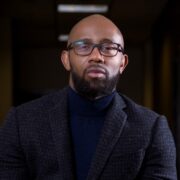MIP’s Diverse Perspectives: Sidney Minter
MIP’s Diverse Perspectives is a monthly blog feature to spotlight a member from North Carolina’s community of diverse attorneys and legal professionals. Members have the opportunity to share a personal perspective through a brief set of interview questions.
This month’s perspective is courtesy of Sidney Minter.
What law school did you attend and what was your graduation year?
North Carolina Central University School of Law; 2011.
What inspired or prompted you to become an attorney?
I was initially prompted to become an attorney by my second-grade teacher, Ms. McCarroll. She joked about how much I liked to talk, and since attorneys talk a lot, she thought I should consider becoming an attorney. This was the first time I considered becoming an attorney.
Once I researched attorneys, I was inspired by the intelligence one must possess and display to be known as a great attorney. I was impressed by the respect attorneys hold in the community. I also noted that with great respect and ability comes great responsibility. Additionally, coming from my hometown of Winston-Salem, I had never seen a Black attorney. This also intrigued me.
When I was in high school, my mom helped me shadow a local Black female judge in family court. It was a rude awakening for me to see so many people being thrown in jail for failure to pay child support. It was also an eye-opening experience seeing a Black woman garner that level of control and respect. I was intrigued, and this feeling never went away during my journey of becoming an attorney. Even after 12 years of practice, I am still proud of my role as an attorney and the responsibility that comes along with that title.
Please describe a barrier or obstacle you have overcome in your professional career.
Imposter syndrome is when people believe they are undeserving of their achievement and the high esteem in which they are held. Prior to 2018, this plagued me.
I felt I was undeserving of certain accolades I received. I cannot tell you why I felt this way or where the feeling came from. But, in August 2018, I attended a conference hosted by Black Enterprise Magazine in Florida that was life-changing in more than one way. During that conference, there was a panel dedicated to Black professionals who dealt with imposter syndrome. Towards the end of the panel, the host allowed members of the audience to sound off on the topic. What surprised me most were the titles of the people who had suffered or were suffering from imposter syndrome. These people were not entry-level professionals.
When I returned from this conference, on September 1, 2018, I started researching imposter syndrome and what I learned was that many incredible leaders also dealt with imposter syndrome (I also learned that I was to be a first-time father). So, I had even more evidence that I was not alone, and that I was worthy of the accolades I had received, and that I would earn and be qualified for awards, accolades, and promotions in the future. Since 2018, I have never felt any impact of imposter syndrome.
So, in conclusion, overcoming imposter syndrome, which has allowed me to walk in my path boldly and confidently, is one of the largest obstacles I have had to overcome.
Do you have a message of encouragement for others who may have experienced similar challenges or adversity as a diverse attorney?
The legal profession is often not an inviting place for Black attorneys. Sadly, in 2023, there are still dinosaurs who believe the profession should not include Black attorneys or diverse attorneys at all. The bar examination, however, is the great equalizer. By that I mean that anyone who passes the examination is competent to practice law. Some qualities include being a deep thinker, a leader, a counselor, and understanding the importance of civility in the practice. And that means that those people who do not want to see you in the profession and/or who give you hell while you are in the profession are nothing but haters. People with that frame of mind are slowly but surely aging out of the practice and making way for people who have open minds. That is my belief and hope for the future of the practice of law.
I have a few points I want to make regarding encouragement. First, believe in yourself. There will be people who do not believe in you, but those people and their opinions do not matter. Second, strive for excellence. Put in the work necessary to be great. For those who follow sports, think of Kobe Bryant’s mantra, the “Mamba Mentality.” Third, embrace constructive criticism, but understand the difference between constructive criticism and destructive criticism. Lastly, do not be afraid to be your authentic self. This does not mean that you should be unprofessional and conduct yourself in a workplace the way you would if you were celebrating at a bar. You must find a balance, which is not always easy — especially when you are new to the practice. But, if you are working in an environment where you do not feel comfortable being your authentic self, then you are in the wrong place. Subsequently, you should leave because you are the Talent! (And your skills will be appreciated elsewhere).

 By
By